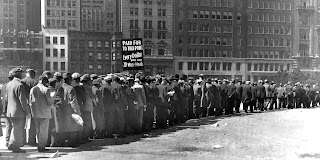The Economic crisis of the early 20s: An Extensive Investigation of the Financial Emergency
Introduction
The Great
Depression remains one of the most significant economic downturns in modern
history. Starting with the stock market crash of 1929, the effects of this
global crisis were far-reaching, affecting individuals, families, and entire
nations. In this comprehensive article, we delve deep into the causes, impacts,
and lasting legacies of The Great Depression. From the devastating consequences
to the gradual recovery, this analysis sheds light on the defining features of
this period in history.
The Great Depression
During The Great
Depression, the world experienced a profound economic crisis that had lasting
effects on various aspects of society. The severe downturn in the global
economy lasted for almost a decade, from 1929 to the late 1930s. Let us explore
the causes and effects of this monumental event.
Causes of The Great Depression

Causes of The Great Depression

Causes of The Great Depression
1. Stock Market Crash The Spark that Ignited the Flames
.jpeg)
Stock Market Crash The Spark that Ignited the Flames
.jpeg)
Stock Market Crash The Spark that Ignited the Flames
The stock market crash of 1929 marked the
beginning of The Great Depression. On October 29, 1929, known as Black Tuesday,
stock prices plummeted, wiping out billions of dollars in wealth.
2. Economic Inequality: Widening the Gap
.webp)
Economic Inequality: Widening the Gap
.webp)
Economic Inequality: Widening the Gap
Economic inequality was a significant
contributing factor to the onset of The Great Depression. The wealth disparity
between the rich and the poor was striking, with a small elite holding a large
portion of the nation's wealth.
3. Overproduction and Underconsumption: A Precarious Balance

Overproduction and Underconsumption: A Precarious Balance

Overproduction and Underconsumption: A Precarious Balance
The 1920s witnessed an unprecedented era of
industrial expansion. However, this rapid growth led to overproduction in
various industries, while consumer demand struggled to keep pace.
Effects of The Great Depression
1. Mass Unemployment: Jobs Disappearing
.jpeg)
Mass Unemployment: Jobs Disappearing
.jpeg)
Mass Unemployment: Jobs Disappearing
The Great Depression led to soaring
unemployment rates worldwide. Millions of individuals found themselves without
work, causing widespread economic hardship and personal suffering.
2. Bank Failures:
Financial Institutions Crumble.jpeg)
Bank Failures: Financial Institutions Crumble
.jpeg)
Bank Failures: Financial Institutions Crumble
The economic collapse resulted in the
failure of numerous banks. As people lost confidence in the banking system,
they rushed to withdraw their savings, leading to further instability.
3. Homelessness and
Poverty: Struggling for Survival.jpeg)
Homelessness and Poverty: Struggling for Survival
.jpeg)
Homelessness and Poverty: Struggling for Survival
The Great Depression forced many families
into destitution, with widespread homelessness and poverty. Basic necessities
became scarce, and soup kitchens and shantytowns emerged as signs of the
desperate times.
Frequently Asked Questions
Q: What were the long-term consequences of The Great Depression?
The Great
Depression had long-lasting effects on society. It led to significant changes
in economic policies, including the establishment of welfare programs and the
regulation of financial institutions. The crisis also reshaped international
relations and fueled political movements advocating for social and economic
reforms.
Q: How did the government respond to The Great Depression?
In response to The
Great Depression, governments worldwide implemented various measures to combat
the crisis. In the United States, President Franklin D. Roosevelt introduced
the New Deal, a series of programs and reforms aimed at providing relief,
recovery, and reform. These initiatives focused on creating jobs, stabilizing
the banking system, and implementing social welfare programs.
Q: Did The Great Depression affect countries other than the United States?
Yes, The Great
Depression had a global impact, affecting countries around the world. The economic
crisis spread to Europe, causing severe recessions and high unemployment rates.
Nations heavily reliant on international trade, such as Germany, suffered
greatly due to declining exports and increased protectionism.
